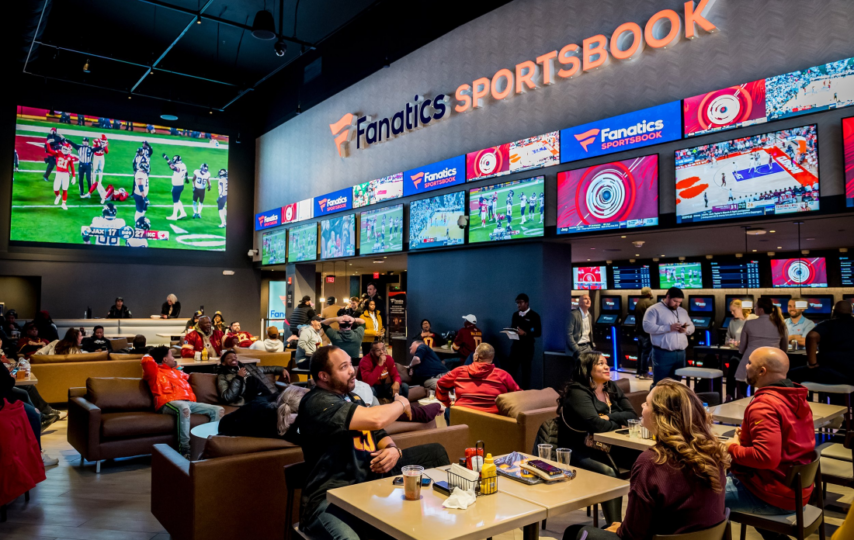The sports betting industry is one of the most successful businesses in the modern world of sports, with tens of billions of dollars wagered in the United States alone every year. With advertisements for most sportsbooks plastered on billboards and running in commercials across the country, you’re almost certain to recognize many of the established names of Las Vegas’ betting titans, whether it’s BetMGM, Caesars Sportsbook or William Hill.
Despite those entrenched brands, there are quite a few newcomers to the party that have enjoyed great success, like Fanatics, DraftKings and FanDuel. Here’s a look at how these entrepreneurial geniuses managed to bring new life to an ancient industry… After all, humans have been gambling since before the dawn of recorded history.
Fanatics Sportsbook
Much like the rampant advertisements for sportsbooks, you’re almost certain to have seen a Fanatics product in the past couple years… assuming you haven’t spent that time with your head under a rock. The brand has exploded over the past decade, encompassing sporting interests like clothing and other merchandise sales, trading cards and, since 2023, sports betting is part of their repertoire as well.
CEO and co-founder Michael G. Rubin began his foray into the world of sports a few years after dropping out of Villanova University, where he realized his talents would be better put to use on the job market right away: the man has a history of betting on himself and winning.
Rubin’s entrepreneurial journey began in the realm of online merchandise sales, laying the foundation for what would become a multi-billion dollar empire. His strategic acquisition and merger with the established Fanatics brand under his company GSI was just the beginning. Rubin’s vision extended to incorporating iconic names like Mitchell and Ness and Topps, celebrated for their connection to baseball, into his expanding portfolio. His foray into the sports betting industry was marked by a strategic move to acquire PointsBet Sportsbook, outmaneuvering competitors like DraftKings. This bold strategy paved the way for the launch of Fanatics Sportsbook, setting a new standard in the industry with its enticing promo code offerings. Rubin’s adeptness at identifying and seizing opportunities has not only diversified his business but also enriched the sports and betting landscape.
FanDuel Sportsbook
Although sports betting was banned in every state but Nevada for more than 25 years following the passage of The Professional and Amateur Sports Protection Act of 1992, there were some loopholes to the legislation that allowed new businesses to take hold. For example, the law never explicitly banned fantasy sports—in part because they didn’t take hold in a major way until the internet era took off, more than a decade after the bill was passed.
Fantasy sports are considered a game of skill, dependent on one’s ability to compile and maintain a roster through drafting a team, adhering to a stipulation like a salary cap, and negotiating complications like trade requests and injuries. As such, lawmakers viewed them as inherently different from the game of luck that is gambling: while one can make educated decisions on who will win a game, at the end of the day one’s betting success hinges on luck as much as anything else, an assumption that’s backed up by research out of MIT.
With sports betting largely outlawed, fantasy sports had a prime opportunity to seize a ripe market, and that’s exactly what FanDuel, now FanDuel Sportsbook, did. Although it was founded across the pond in Edinburgh, Scotland, FanDuel got its start with American sports in mind, hosting one of their inaugural fantasy events based on the 2010 NFL season. After taking in $1.2 million US in venture capital in order to get started, the brand has grown to a value of more than $20 billion as of 2022, an increase of nearly 20,000 times in a span of 13 short years. By getting a head start on the American sports market through fantasy sports, FanDuel managed to establish reputable relationships with their customers, helping them hit the ground running once they could delve into the traditional sports betting industry.
DraftKings Sportsbook
As the name suggests, DraftKings got its start much like FanDuel did, capitalizing on the void left during the sports betting ban by delving into the world of fantasy sports. The two companies attempted a merger in 2016 after leaping out to pace the fantasy sports industry, but the Federal Trade Commission blocked the move in order to break up any potential monopoly.
Despite the setback, DraftKings has done quite well for itself, announcing a market cap of $19.27 billion on Friday, March 8. That number is sure to explode in the coming months with sports betting going live in the state of North Carolina, as the company’s ability to succeed in both the fantasy sports and traditional sports betting arenas make them one of the hottest trading options on the stock market.








